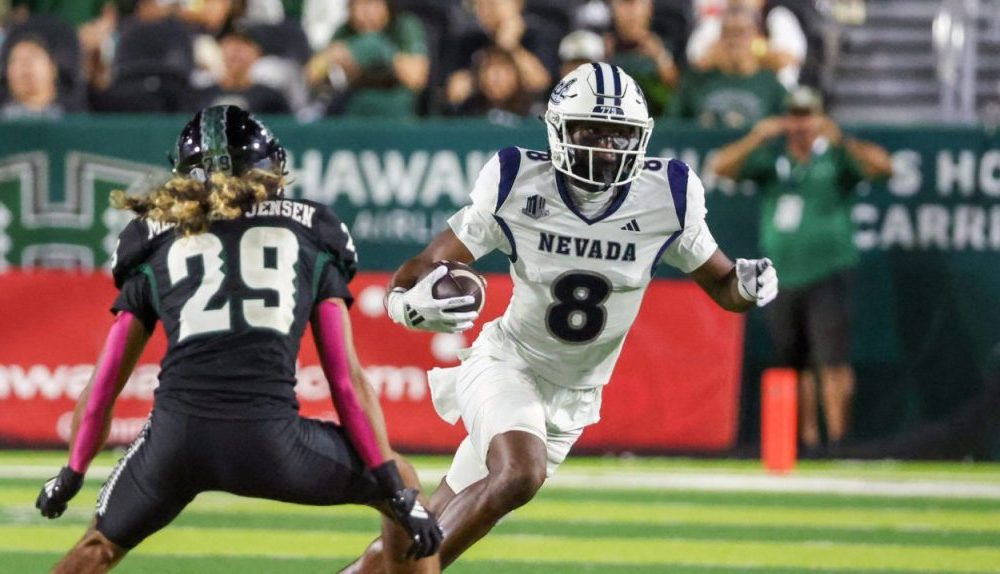College Sports
Cortez Braham Sues NCAA to Keep Playing College Football at Nevada
University of Nevada (Reno) wide receiver Cortez Braham Jr. sued the NCAA on Tuesday in hopes of becoming eligible for his seventh season in college sports and fourth as a Division I athlete. Braham joins a growing list of college athletes who have sued the NCAA with antitrust claims in hopes of obtaining court orders […]

University of Nevada (Reno) wide receiver Cortez Braham Jr. sued the NCAA on Tuesday in hopes of becoming eligible for his seventh season in college sports and fourth as a Division I athlete.
Braham joins a growing list of college athletes who have sued the NCAA with antitrust claims in hopes of obtaining court orders that enable them to play after exhausting NCAA eligibility. The players, who have enjoyed mixed results in court, argue they would lose out on lucrative NIL deals and the chance to further their development as NFL prospects unless they can keep playing. One complicating factor is that the NCAA is not a pro sports league but instead a member organization that oversees full-time college students who play sports and who must maintain academic requirements.
Braham is one of the Wolf Pack’s best players. Starting all 13 games in 2024, the 6’2”, 201-pound receiver was second on the team in receptions (56) and in receiving yards (724). If Braham’s eligible to play this fall, he says he would land a “once-in-a-lifetime NIL contract opportunity worth nearly $500,000” in addition to augmenting his skills in hopes of a career in pro football.
But Braham is not currently eligible under NCAA rules to play in the 2025-26 academic year. NCAA eligibility rules limit an athlete’s participation in NCAA sports to five calendar years from when the athlete begins studying at a college and four seasons of intercollegiate competition (including junior college competition) in any one sport. The rules also limit junior college transfers to a maximum of three years of D-I sports.
Braham’s college journey began in 2019, when he graduated from Westwood High School in Blythewood, S.C. A three-star rated prospect by ESPN and 247Sports, Braham enrolled at Hutchinson Community College (HCC) in Kansas and played for the school’s team, the Blue Dragons, which competes in the National Junior College Athletic Association (NJCAA).
Braham played three seasons (2019, 2020 and 2021) for the Blue Dragons, which won the NJCAA national championship in 2021. The receiver intended to transfer to West Virginia University in 2021, but his GPA of 2.47 was too low. The NCAA requires a 2.5 GPA for a JUCO player to transfer and play at a four-year school, a standard that Braham points out is higher than the academic requirements the NCAA stipulates for an athlete to transfer from one four-year school to another.
Braham raised his GPA and transferred to WVU, where he played two seasons (2022 and 2023). He then transferred to Nevada for his 2024 season.
Braham believed he would be eligible to play at Nevada this fall given the aftermath of Vanderbilt quarterback and former junior college transfer Diego Pavia’s litigation play in 2025. After Pavia secured an injunction last December, the NCAA granted a waiver to allow similarly situated former JUCO players to play a fourth year of D-I in 2025 (The NCAA has appealed the court ruling in Pavia’s favor to the U.S. Court of Appeals for the Sixth Circuit). Pavia had played two seasons of JUCO football and then, like Braham, three in D-I.
But according to Braham, Nevada has refused to file a waiver on his behalf with the NCAA—a required step for attempting to continue his eligibility. The complaint refers to Nevada athletic administrators allegedly telling Braham and his representatives that while the university would not file a waiver, he could hire an attorney and sue the NCAA in hopes of securing a favorable court order. Braham’s complaint says his “inability to seek assistance from the NCAA directly” is “yet another example of the NCAA erecting procedural barriers that disproportionately burden JUCO athletes.”
Drafted by attorneys Brandon D. Wright and Gregg E. Clifton of Lewis Brisbois Bisgaard & Smith, Braham’s complaint raises what have become familiar antitrust arguments against NCAA eligibility rules. These rules are portrayed as unlawfully restraining the labor market for players and denying those players a chance to (1) earn NIL money—which reflects not only an athlete’s individualized marketability but the athlete’s association with a collegiate program; (2) further hone their talents in preparation for a career in the pros; and (3) receive the educational benefits of college courses. Braham seeks a court declaration and an injunction.
The NCAA did not respond to a request for comment, but its attorneys will answer Braham’s complaint in court. The NCAA and supporters of NCAA eligibility rules have argued that antitrust laws ought not to apply since eligibility rules are arguably more about education than commercial activities. These rules are described as appropriate for college sports given the role of education, and they can harmonize athletic and academic expectations. Also, by ensuring that college players can’t pursue long-term or indefinite careers in college football, the rules allegedly distinguish college sports as distinct from minor league sports.
U.S. District Judge Miranda M. Du and U.S. Magistrate Judge Craig S. Denney of the federal district court in Nevada will preside over Cortez v. NCAA.